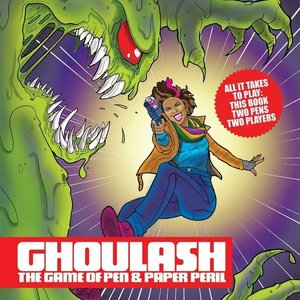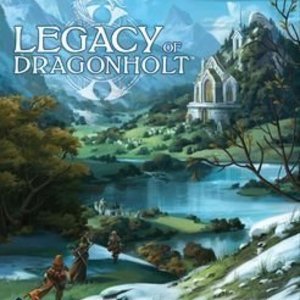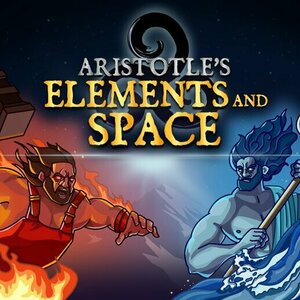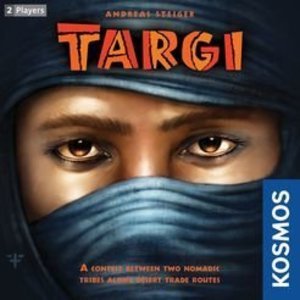Search
Search results
Peter Russell (61 KP) rated Legacy of Dragonholt in Tabletop Games
May 3, 2019
Its an rpg without a dm (1 more)
The biggest book based choose your adventure youve probably ever played
As with any choose your adventure choices can seem limiting (2 more)
The game is the only one of its kind and feels like it should be a series, but unfortunately discontinued
Its a one time playthrough
Largest choose your adventure ever
This game takes on roleplaying games for a single player rpg experience using "choose your adventure" style mechanics. At the beginning of the game a player makes a character, chooses a class and chooses skills. These character design choices do very much affect gameplay, providing different adventure paths/ options for characters of different races or having given skills in a situation. The box includes multiple adventures, each with a rough playtime of 30-60 minutes, though it can become longer with more players. Each booklet is designed to be played as a single gaming session, providing a convenient place to stop for the night or for a breather. The game also has a story tracking mechanic where bubbles are filled in based on choices made. These can affect interaction with npcs or track overarching campaign events that have shaped the world.
I played through this game once and it took me about 6 hours and feel tgere are not enough alternate choices to merit another playthrough. Even though the game says it can be played with 1 to 6 players I recommend one player because only a single choice can be made with each entry and multiple players may not agree on a single course of action. For this game you fo need some tablespace as there are lots of tracking sheets and books and possibly a map you will have out.
*Minor Spoiler Ahead
My overall view of this game is that I wish it was different in one of two ways.
1. It would be nice if there were expansions to this where a character could carry over to another campaign or an expansion that weaves in more npc drama. At the end there are only 4 possible endings and then the game just ends, I wanted more, but knew it would never be.
2. This game with all of its tracking was more akin to muds and I feel it would have been better suited (at least for single player) as an interactive book for a computer where the tracking is done behind the scenes. This would of provided more mystery and made the game feel more in the moment rather than breaking out of the story to reference tracking sheets to see if a choice was allowed.
I played through this game once and it took me about 6 hours and feel tgere are not enough alternate choices to merit another playthrough. Even though the game says it can be played with 1 to 6 players I recommend one player because only a single choice can be made with each entry and multiple players may not agree on a single course of action. For this game you fo need some tablespace as there are lots of tracking sheets and books and possibly a map you will have out.
*Minor Spoiler Ahead
My overall view of this game is that I wish it was different in one of two ways.
1. It would be nice if there were expansions to this where a character could carry over to another campaign or an expansion that weaves in more npc drama. At the end there are only 4 possible endings and then the game just ends, I wanted more, but knew it would never be.
2. This game with all of its tracking was more akin to muds and I feel it would have been better suited (at least for single player) as an interactive book for a computer where the tracking is done behind the scenes. This would of provided more mystery and made the game feel more in the moment rather than breaking out of the story to reference tracking sheets to see if a choice was allowed.
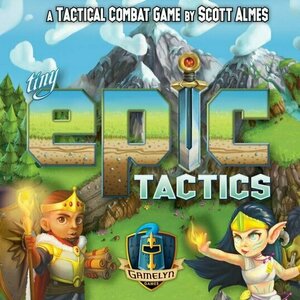
Tiny Epic Tactics
Tabletop Game
Tiny Epic Tactics utilizes a simple combat system with variable player powers and 3-D terrain to...
Thundercat recommended Issues by Korn in Music (curated)
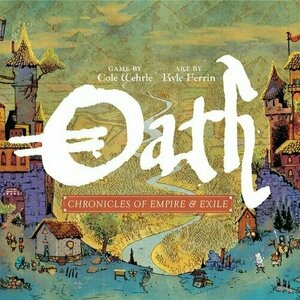
Oath: Chronicles of Empire and Exile
Tabletop Game
In Oath, one to six players guide the course of history in an ancient land. Players might take the...
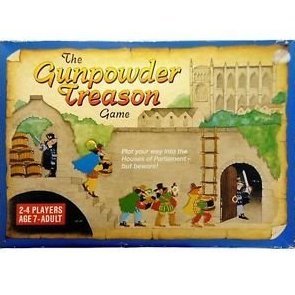
Gunpowder Treason
Tabletop Game
The perfect game to play November 5, Gunpowder Treason is a game based on Guy Fawkes' attempt to...
Boardgames RetroGames
Purple Phoenix Games (2266 KP) rated Aristotle's Elements and Space in Tabletop Games
Nov 5, 2020
The Cosmos! So many of us dream of flying up into space to enjoy the views and hopes of a better life on another planet. Some would like to study space more closely to unravel its mysteries. Still others would think it’s just kinda cool to be weightless and IN SPACE! I’m a mixture of all these, so when I heard a call for reviewers for a game whose title includes a major philosopher, elements of all matter, AND SPACE I just had to know more and play it. Would Aristotle take pride in this card game’s premise or has it shot for the moon and is now drifting among the space junk?
Aristotle’s Elements and Space is a party style card game for three to five players. Players will be attempting to play elements to triumph over their opponents by using tried and true rock-paper-scissors style play.
DISCLAIMER: We were provided a prototype copy of this game for the purposes of this review. These are preview copy components, and I do not know for sure if the final components will be any different from these shown. Also, it is not my intention to detail every rule in the game, as there are just too many. You are invited to download the rulebook, back the game through the Kickstarter campaign, or through any retailers stocking it after fulfillment. -T
To setup stock the token bag (not pictured) with tokens according to the rulebook suggestions for number of players. Each player will blindly choose three tokens from the bag to place in front of themselves within reach of all players. Shuffle the element cards and deal each player seven. Determine the first Aristotle player and place the Aristotle card facing that player. Shuffle and deal out three Element of Surprise cards face-down within reach of all players. The game may now begin!
Each game lasts seven rounds. At the start of each round players will secretly choose a card from hand to play to the table face down. Once all players are ready all players must simultaneously say out loud, “Aristotle,” while flipping over their cards. When all cards are revealed the Aristotle player will compare cards with the player on their left. Whichever element card played triumphs over the other will win that battle and continue onward clockwise to battle the other players. This continues until one player has triumphed all the cards and taken the trick. The Aristotle card is then given to the next player in clockwise seating to begin a new round. This is how a basic game is played.
More advanced games will include Power Up Tokens and the Element of Surprise Cards. In order to use a Power Up Token a player would first need to have successfully stolen another player’s token during a round of play. To successfully steal a token the player will physically take a token from another player without being touched by that player. Should the defending player touch or slap the offensive player’s hand during the theft, the heist is unsuccessful. Once stolen a token may be used on a subsequent round.
The Power Up Tokens increase the number of elements that may be triumphed using a particular element. For instance, Fire typically triumphs over Earth and Wind, but with the Power Up Token also applied the Fire triumphs over Earth, Wind, AND Water. A most welcome twist! Also, during a round in which a player is acting as Aristotle they may, once cards are revealed, call, “Element of Surprise!,” and choose a face-down card to read aloud to the group. These cards add a goofy rule that must be thenceforth followed, gives prompts for the players to discuss, or has players searching the room/house/wherever for items to bring back to the table first.
Play continues in this fashion until the last round, where triumph rules are reversed. When all cards have been played the winner is the player who won the most tricks.
Components. Again, this is a prototype version of the game. That said, what we received was a bunch of cards and the Power Up Tokens. The tokens are fine – laser cut plywood discs painted on both sides to match the elements they modify. The cards are glossy and feature unique art. The art is, well, just okay for me. It’s not terribly exciting, but it is very colorful and not bad, necessarily. I feel like the art could be improved some, but art is always a personal preference.
The gameplay itself is certainly a hodge-podge of mechanics from other games that, for the most part, are well-used for a very light trick-taking card game. I enjoy playing it using the Power Up Tokens, but for me and my group, we passed on the Element of Surprise cards. They add a different twist to the game that isn’t necessarily Quelf-ish, but also doesn’t add much to the game. They merely add a distraction from the game. I can see many people totally diggin’ those cards, and I probably would use them if converting a game-noob, but for more serious gamers, just leave them out.
If you are looking for a very light and different trick-taking card game, check out Aristotle’s Elements and Space. I am not entirely sure if any components will be updated before going to retail, but even if not, they are pretty decent. The gameplay is quick and easy to teach; I think I will try it with my 4-year-old as well. This is a decent gateway filler that could fit very well in many collections. Give it a look!
Aristotle’s Elements and Space is a party style card game for three to five players. Players will be attempting to play elements to triumph over their opponents by using tried and true rock-paper-scissors style play.
DISCLAIMER: We were provided a prototype copy of this game for the purposes of this review. These are preview copy components, and I do not know for sure if the final components will be any different from these shown. Also, it is not my intention to detail every rule in the game, as there are just too many. You are invited to download the rulebook, back the game through the Kickstarter campaign, or through any retailers stocking it after fulfillment. -T
To setup stock the token bag (not pictured) with tokens according to the rulebook suggestions for number of players. Each player will blindly choose three tokens from the bag to place in front of themselves within reach of all players. Shuffle the element cards and deal each player seven. Determine the first Aristotle player and place the Aristotle card facing that player. Shuffle and deal out three Element of Surprise cards face-down within reach of all players. The game may now begin!
Each game lasts seven rounds. At the start of each round players will secretly choose a card from hand to play to the table face down. Once all players are ready all players must simultaneously say out loud, “Aristotle,” while flipping over their cards. When all cards are revealed the Aristotle player will compare cards with the player on their left. Whichever element card played triumphs over the other will win that battle and continue onward clockwise to battle the other players. This continues until one player has triumphed all the cards and taken the trick. The Aristotle card is then given to the next player in clockwise seating to begin a new round. This is how a basic game is played.
More advanced games will include Power Up Tokens and the Element of Surprise Cards. In order to use a Power Up Token a player would first need to have successfully stolen another player’s token during a round of play. To successfully steal a token the player will physically take a token from another player without being touched by that player. Should the defending player touch or slap the offensive player’s hand during the theft, the heist is unsuccessful. Once stolen a token may be used on a subsequent round.
The Power Up Tokens increase the number of elements that may be triumphed using a particular element. For instance, Fire typically triumphs over Earth and Wind, but with the Power Up Token also applied the Fire triumphs over Earth, Wind, AND Water. A most welcome twist! Also, during a round in which a player is acting as Aristotle they may, once cards are revealed, call, “Element of Surprise!,” and choose a face-down card to read aloud to the group. These cards add a goofy rule that must be thenceforth followed, gives prompts for the players to discuss, or has players searching the room/house/wherever for items to bring back to the table first.
Play continues in this fashion until the last round, where triumph rules are reversed. When all cards have been played the winner is the player who won the most tricks.
Components. Again, this is a prototype version of the game. That said, what we received was a bunch of cards and the Power Up Tokens. The tokens are fine – laser cut plywood discs painted on both sides to match the elements they modify. The cards are glossy and feature unique art. The art is, well, just okay for me. It’s not terribly exciting, but it is very colorful and not bad, necessarily. I feel like the art could be improved some, but art is always a personal preference.
The gameplay itself is certainly a hodge-podge of mechanics from other games that, for the most part, are well-used for a very light trick-taking card game. I enjoy playing it using the Power Up Tokens, but for me and my group, we passed on the Element of Surprise cards. They add a different twist to the game that isn’t necessarily Quelf-ish, but also doesn’t add much to the game. They merely add a distraction from the game. I can see many people totally diggin’ those cards, and I probably would use them if converting a game-noob, but for more serious gamers, just leave them out.
If you are looking for a very light and different trick-taking card game, check out Aristotle’s Elements and Space. I am not entirely sure if any components will be updated before going to retail, but even if not, they are pretty decent. The gameplay is quick and easy to teach; I think I will try it with my 4-year-old as well. This is a decent gateway filler that could fit very well in many collections. Give it a look!
Red Otter (340 KP) rated Targi in Tabletop Games
Jun 6, 2019
Targi is a 2-player game where players play as opposing desert tribes. Both sides try to collect as many points, either through grabbing additional VP tokens or by gathering various tribe cards. These tribe cards belong to one of 5 sets, with additional points for gathering sets, either of the same kind or one of each.
The game is played with a with an ever changing 5x5 grid of goods and tribe cards, with a outer ring of cards that can almost ways been selected. A robber goes around blocks off some of the outer rings of cards and serves as a timer for the game. The worker placement portion is interesting, 3 workers are placed on the outside ring, and the intersections they create between themselves are where you ace your next two.
Targi is a relatively simple game with depth. It requires outthinking your opponent as it is relatively easy to deny the other player what they want, but not necessarily get what you need at the same time. The balance comes from trying to acquire points while at the same time getting the resources to buy those cards in the first placrz especially with the heavy emphasis on points from set collections. A great game for couples
The game is played with a with an ever changing 5x5 grid of goods and tribe cards, with a outer ring of cards that can almost ways been selected. A robber goes around blocks off some of the outer rings of cards and serves as a timer for the game. The worker placement portion is interesting, 3 workers are placed on the outside ring, and the intersections they create between themselves are where you ace your next two.
Targi is a relatively simple game with depth. It requires outthinking your opponent as it is relatively easy to deny the other player what they want, but not necessarily get what you need at the same time. The balance comes from trying to acquire points while at the same time getting the resources to buy those cards in the first placrz especially with the heavy emphasis on points from set collections. A great game for couples
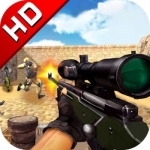
Counter Terrorist War - Sniper Shoot Strike
Games and Sports
App
Go! Go! Go! Classic Multi-Players FPS Games is coming. Anti-terrorist Sniper Team is the most...

